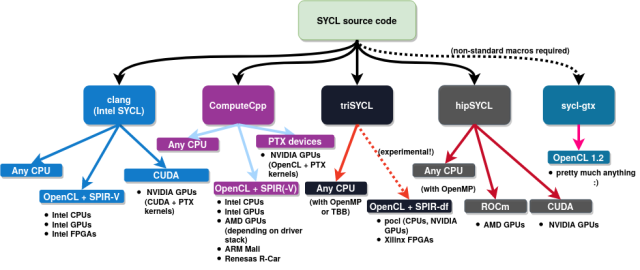
The new collaboration immediately followed Intel's own announcement of the oneAPI specification reaching 1.0 status. The 1.0 milestone is significant, since it enables collaborators to focus on adapting hardware to a standard, fixed implementation, without worrying about the specification itself shifting rapidly beneath their feet.
URZ's own announcement of the oneAPI Center of Excellence begins by reiterating the raison d'etre of oneAPI itself:
URZ will focus its research and programming efforts on a fundamental high-performance computing (HPC) challenge where modern computers utilize different types of hardware for different calculations. Accelerators, including graphics processing units (GPUs) and field programmable gate arrays (FPGAs), are used in combination with general compute processors (CPUs). Using different types of hardware make computers very powerful and provide versatility for a wide range of situations and workloads. Hardware heterogeneity, however, complicates software development for these computers, especially when specialized components from a variety of vendors are used in tandem.
One major reason for this complication is that many accelerated compute architectures require their own programming models. Therefore, software developers need to learn and use a different—and sometimes proprietary—language for each processing unit in a heterogeneous system, which increases complexity and limits flexibility.
oneAP's cross-architecture language Data Parallel C++ (DPC++), based on Khronos Groups' SYCL standard for heterogeneous programming in C++, overcomes these challenges with its single, unified open development model for performant and productive heterogeneous programming and cross-vendor support.
URZ's collaboration on the oneAPI standard looks like it will be a good start toward fulfilling Intel's promises that oneAPI will be about all hardware, not just Intel's. The development efforts will be led by Aksel Alpay, who is specifically trying to bring AMD (Radeon) GPU support to oneAPI.

To fully understand this, we need to dive a little deeper into oneAPI's underlying technologies. OneAPI is built on top of Intel's Data Parallel C++ (DPC++), which is itself built atop C++ and Khronos SYCL code abstraction layer standards. Alpay is himself the founding developer of the hipSYCL implementation of the SYCL standard, and his work already explicitly supports multiple CPUs, Nvidia GPUs via CUDA, and AMD GPUs via ROCm.
The new oneAPI Center of Excellence will employ Alpay (and others) to add DPC++ capabilities and support into hipSYCL, which already supports Intel and AMD CPUs, Nvidia GPUs, and AMD (Radeon) GPUs natively. URZ's researchers and developers will, in turn, have access to "an international network of experts" including those at Intel, as well as other academic and government institutions.
Here's what Professor Vincent Heuveline, CIO of Heidelberg University and URZ managing director, had to say:
The university's work helps bring about the promises Intel has made since day one of oneAPI being an effectively vendor-neutral, cross-hardware-platform effort—and, probably not by accident, break the near-monopoly Nvidia has enjoyed in the GPU accelerated machine learning ecosystem for years. Breaking that de facto monopoly benefits Intel's own new and rising Xe Graphics platform, as well as AMD's own Radeon, which has so far largely been limited to "traditional" graphics and gaming use.For a scientific computing center to have access to this level of expertise and work together on an open standard with partners from around the globe, is a wonderful prospect.
reader comments
46